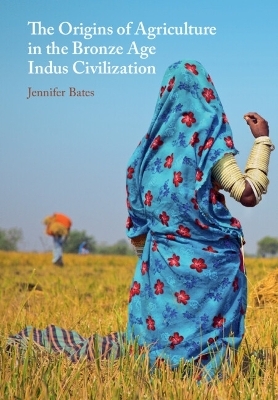
The Origins of Agriculture in the Bronze Age Indus Civilization
Seiten
2024
Cambridge University Press (Verlag)
978-1-009-42444-8 (ISBN)
Cambridge University Press (Verlag)
978-1-009-42444-8 (ISBN)
- Noch nicht erschienen (ca. Dezember 2024)
- Versandkostenfrei innerhalb Deutschlands
- Auch auf Rechnung
- Verfügbarkeit in der Filiale vor Ort prüfen
- Artikel merken
The Indus civilization in South Asia (c. 3200 – 1500BC) was one of the most important Old World Bronze Age cultures. This study offers new insights into the Indus civilisation through an archaeobotanical reconstruction of its environment. It synthesizes the available data on genetics, archaeobotany, and archaeology.
The Indus civilization in South Asia (c. 320 – 1500BC) was one of the most important Old World Bronze Age cultures. Located at the cross-roads of Asia, in modern Pakistan and India, it encompassed ca. one million square kilometers, making it one the largest and most ecologically, culturally, socially, and economically complex among contemporary civilisations. In this study, Jennifer Bates offers new insights into the Indus civilisation through an archaeobotanical reconstruction of its environment. Exploring the relationship between people and plants, agricultural systems, and the foods that people consumed, she demonstrates how the choices made by the ancient inhabitants were intertwined with several aspects of society, as were their responses to social and climate changes. Bates' book synthesizes the available data on genetics, archaeobotany, and archaeology. It shows how the ancient Indus serves as a case study of a civilization navigating sustainability, resilience and collapse in the face of changing circumstances by adapting its agricultural practices.
The Indus civilization in South Asia (c. 320 – 1500BC) was one of the most important Old World Bronze Age cultures. Located at the cross-roads of Asia, in modern Pakistan and India, it encompassed ca. one million square kilometers, making it one the largest and most ecologically, culturally, socially, and economically complex among contemporary civilisations. In this study, Jennifer Bates offers new insights into the Indus civilisation through an archaeobotanical reconstruction of its environment. Exploring the relationship between people and plants, agricultural systems, and the foods that people consumed, she demonstrates how the choices made by the ancient inhabitants were intertwined with several aspects of society, as were their responses to social and climate changes. Bates' book synthesizes the available data on genetics, archaeobotany, and archaeology. It shows how the ancient Indus serves as a case study of a civilization navigating sustainability, resilience and collapse in the face of changing circumstances by adapting its agricultural practices.
Jennifer Bates is Assistant Professor of Archaeological Science at Seoul National University. She is a co-author of The Archaeobotany of Asvan and Principal Investigator of the Indica Project.
1. Introduction; 2. The Paleoenvironmental context; 3. Laying the groundwork; 4. Southwest Asian crops and their significance; 5. Big millets; 6. Small Millets; 7. Rice; 8. Tropical pulses and the identification of local domestication processes; 9. Microfossils and the multi-proxy approach; 10. Beyond 'staples'; 11. Crop processing and social organization; 12. Cropping strategies and seasonality; 13. Irrigation and intensification; 14. Indus indentities and food; 15. The 'Late Harappan Revolution'; 16. The burnt remains.
| Erscheint lt. Verlag | 31.12.2024 |
|---|---|
| Zusatzinfo | Worked examples or Exercises |
| Verlagsort | Cambridge |
| Sprache | englisch |
| Themenwelt | Geisteswissenschaften ► Archäologie |
| Geschichte ► Allgemeine Geschichte ► Vor- und Frühgeschichte | |
| ISBN-10 | 1-009-42444-0 / 1009424440 |
| ISBN-13 | 978-1-009-42444-8 / 9781009424448 |
| Zustand | Neuware |
| Informationen gemäß Produktsicherheitsverordnung (GPSR) | |
| Haben Sie eine Frage zum Produkt? |
Mehr entdecken
aus dem Bereich
aus dem Bereich
Was Pompeji über uns erzählt
Buch | Hardcover (2023)
Propyläen (Verlag)
32,00 €
auf den Spuren der frühen Zivilisationen
Buch | Hardcover (2023)
C.H.Beck (Verlag)
20,00 €


